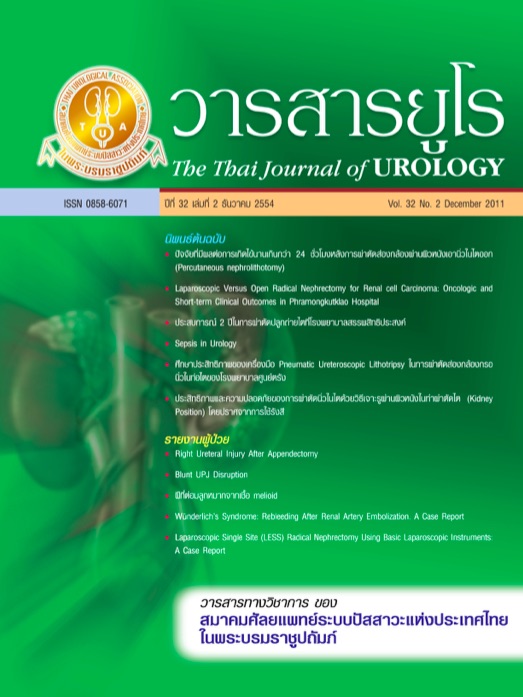Laparoscopic Versus Open Radical Nephrectomy for Renal Cell Carcinoma: Oncologic and Short-term Clinical Outcomes in Phramongkutklao Hospital
Keywords:
Laparoscopic radical nephrectomy, Open radical nephrectomy, renal cell carcinoma, Oncologic and Short-term clinical outcomesAbstract
Background: Laparoscopic surgery for renal cell carcinoma is a recognized treatment modality. The advantage of the laparoscopic procedure include better visualization of critical structures such as blood vessels (renal artery and renal vein) and surrounding organs, less tissue trauma and blood loss, less post operative pain, earlier operative recovery and shorter hospital stay. The objective of this study was to review and compare short-term oncologic as well as various perioperative outcome between laparoscopic and open surgery for renal cell carcinoma, as performed by one surgeon at Phramongkutklao hospital.
Method: Medical records of and pathologic findings in patients with renal cell carcinoma treated by one surgeon (Satit Siriboonrid, MD) during the period from June 2007 to June 2010 were reviewed. Baseline data, radiologic results, tumor characteristics, operative findings and follow-up data were abstracted from the records. Renal cell carcinoma staging was according to the American joint Committee on Cancer, 2002.
Result: During the period between June 2007 and June 2010, 145 patients fulfilling the inclusion criteria were operated on for renal cell carcinoma by one surgeon. Of these, 75 (51.7%) underwent laparoscopic radical nephrectomy and 70 (48.3%) underwent open radical nephrectomy. No significant difference could be detected in basic data. Laparoscopic surgery was associated with longer operative time than open surgery, although there was less blood loss. Pathologic examination of the resected specimens did not reveal any statistically or clinically significant differences between the two groups in terms of tumor-free margins and tumor grade. The occurrence of postoperative complications, including infectious complications, was not clearly different between the two groups of patients. The amount of postoperative morphine required for pain was significantly less in the laparoscopic group. The delay bowel movement or oral diet was also significantly less for the laparoscopic group.
Conclusion: There was no evidence of any significant difference between laparoscopic and open surgery for patient with renal cell carcinoma in the term of operative and early oncologic outcomes in the present study. More patients need to be included in a future analysis. Further long-term follow-up is still warranted to confirm or refute the present finding.
References
Clayman RV, Kavoussi LR, Soper NJ, Dierks SM, Meretyk S, Darcy MD, et al. Laparoscopic nephrectomy: Initial case report. J Urol 1991; 146:278-82.
Clayman RV, Kavoussi LR, McDougall EM, Soper NJ, Figenshau RS, Chandhoke PS, et al. Laparoscopic nephrectomy: A review of 16 cases. Surg Laparosc Endosc 1992; 2:29-34.
Cadeddu JA, Ono Y, Clayman RV, Barrett PH, Janetschek G, Fentie DD, Laparoscopic nephrectomy for renal cell cancer: evaluation of efficacy and safety: a multicenter experience. Urology 1998; 52(5):773-7.
Chan DY, Cadeddu JA, Jarrett TW, Marshall FF, Kavoussi LR. Laparoscopic radical nephrectomy: cancer control for renal cell carcinoma. J Urol 2001; 166(6):2095-9.
Kerbl K, Clayman RV, Mc Dougall E, Kavoussi LR. Laparoscopic nephrectomy: current status. Arch Esp Urol 1993; 46(7):581-4.
Fahlenkamp D, Rassweiler J, Fornara P, Frede T, Loening SA. Complications of laparoscopic procedures in urology: experience with 2,407 procedures at 4 German centers. J Urol 1999; 162(3 Pt 1):765-70.
Copcoat MJ, Joyce AJ, Popert R, et al: Laparoscopic nephrectomy the Kingûs experience. Minim Invas Ther 1992; 1(Suppl):67.
Shuford MD, McDougall EM, Chang SS, LaFleur BJ, Smith JA Jr, Cookson MS. Complications of contemporary radical nephrectomy: comparison of open vs. laparoscopic approach. Urol Oncol 2004; 22(2):121-6.
Varkarakis I, Neururer R, Harabayashi T, Bartsch G, Peschel R. Laparoscopic radical nephrectomy in the elderly. BJU Int 2004 Sep; 94(4):517-20.
Rassweiler JJ, Stock C, Frede T, Seemann O, Henkel T, Alken P. Transperitoneal and retroperitoneal laparoscopic nephrectomy incomparison with conventional nephrectomy. Urologe A 1996; 35(3):215-22.
Rassweiler J, Fornara P, Weber M, Janetschek G, Fahlenkamp D, Henkel T, et al. Laparoscopic nephrectomy: the experience of the laparoscopy working group of the German Urologic Association. J Urol 1998; 160(1):18-21.
Kerbl K, Clayman RV, McDougall EM, Gill IS, Wilson BS, Chandhoke PS, et al. Transperitoneal nephrectomy for benign disease of the kidney: a comparison of laparoscopic and open surgical techniques. Urology 1994; 43(5):607-13.



